
28 minute read
UK £115 Overseas (surface) £146
be Albert certified.” The Albert scheme is twofold, encompassing both “the footprint” and “the carbon action plan”.
Carys Taylor, Bafta’s director of the scheme, explains that “the footprint gives the team members a sense of where their impacts are, while the action plan involves filling in a form of 60 or so questions ahead of production. This shows expectations, likely high-impact areas and plans to reduce their carbon footprint, eliminate waste and monitor supply chains.”
Advertisement
To be certified and gain the Albert logo, the production team must then provide evidence, which Taylor assures me “is assessed by a human being, with spot checks to ensure the accuracy of the data”. Only then does Bafta hand over the cherished footprint logo
– hence Sill’s heroic efforts to log all those taxis.
Bafta supports the scheme with a catalogue of training resources, advice and tips. There are also partnerships with universities and expanding editorial opportunities to explore sustainability in storytelling.
“It’s not just policing,” insists Taylor. “It’s about providing knowledge, resources and guidance plus a wealth of collaborative experience and learning. The calculator can seem quite robotic, but it’s about bringing people on this journey, and enabling creatives within the industry to inspire a sustainable future for all.”
Everyone on this journey agrees that the size and location of a production will massively affect the carbon emissions. However, across the board, the two biggest problems are transport and power. “As technology improves with alternative fuel for generators, we are beginning to see a difference,” reports Taylor. “Plus transport was massively reduced during the pandemic – it was one of the very few benefits.”
The kind of incentives that might accompany certification, Taylor makes clear, remain up to the broadcasters. It is clear, however, that Albert certification, if not yet universally mandated, is becoming an expectation across the industry. For the 2022 Bafta Awards, entrants will be asked whether they have achieved certification, and Taylor favours the creation of an additional green storytelling award.
For Mills at BBC Studios, sustainability is at the heart of her commercial business. “Not just reputationally, but for talent attraction,” she says. “Like diversity, it should just be embedded in everything we do.”
But, while she applauds the collective mindset in addressing the chal-
lenges, she recognises that there are obstacles yet to be overcome: “One challenge is matching that desire with resources, creating the infrastructure to support these initiatives. Everyone wants to use electric vehicles. It might be that you are filming in such a remote place that you can’t plug in, or you can’t source a vehicle because there simply aren’t enough everywhere.
“Equally, fast-turnaround shows can be hectic, crewing up overnight, where people are trying to gather all this evidence on the fly while simultaneously following health and safety protocols and all the other requirements. The [Albert] tool takes into account, that you might have to submit what you can and follow up afterwards.”
On the other hand, she points out the innovation that came to the fore during lockdown, including when The Big Night In was sourced mainly through user-generated content on Zoom and Winterwatch used local crews and hydrogen generators. She says: “This is an opportunity for people to think differently, both on the operational and creative sides.”
Coulter agrees, and reflects: “Everyone has to buy into it editorially, too. Can we put a recycling bin in the kitchen of a scene? Can a character take public transport instead of driving? Soon, I predict we won’t be showing paper cups on screen, it’ll be as odd as seeing someone smoking.”
Danielle Mulder, the BBC’s first director of sustainability, is charged with leading the corporation to its target of net zero carbon by 2030. She is confident that no stick or carrot is required for the Albert scheme to continue to evolve. She says: “The production teams all want to do this. There isn’t a stick needed. What we want to do is to bring it to life and make it real
for people. They know what the ask is and what the solutions are. This isn’t going away, so we want everyone to get comfortable with that.”
While signing up to the scheme is free, one of Albert’s biggest tools is its provision for companies to offset their carbon footprint with a financial sum. “Our mantra is: avoid and reduce – but what is left, you can offset,” explains Taylor. “There’s an incentive to get it as low as possible, so the fee is as low as possible. Our scheme costs £9 per tonne, but it isn’t mandatory to use ours to achieve certification.”
Over on the set of Guilt, where Sill is monitoring all her log sheets and entering fresh data into her Albert calculations, wherever possible replacing tungsten bulbs with LED lighting, she attests to the deep sense of satisfaction of seeing that offset figure reduce in real time.
“It makes you want to look for new solutions,” she says. “It makes you think: ‘What are we doing already, and how can we keep going?’” n
Location shooting can be extremely energy intensive
Futurikon
TV’s war on carbon
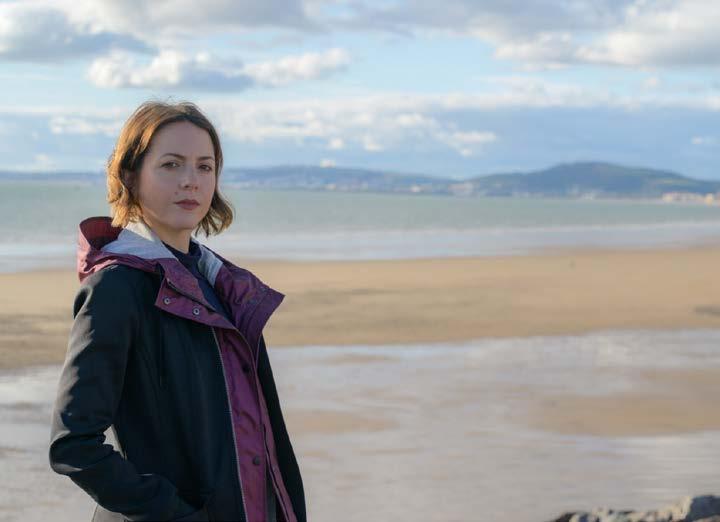
S4C
Many TV producers have benn making great efforts to cut their carbon footprint over the past few years. There is still much more to do behind the camera, but more attention is now being given to environmental messages on-screen.
The panel assembled for an RTS Cymru Wales event this month boasted the two winners of the Edinburgh TV Festival Green Award. Roger Williams’s bilingual cop series Bang won the inaugural award in 2020, while Sky Sports, represented on the panel by its manager for responsible production, Jo Finon, won this year.
Joining them on the panel were Greg Mothersdale, environmental lead at South Wales screen and TV body Clwstwr, and Sally Mills, head of operations and sustainability lead for BBC Studios.
Williams, who heads his own indie, Joio TV, said: “I was a writer [and] my carbon footprint personally was very low – I worked at home before most people worked from home.… It was only when I became responsible for the means of production that I realised [how we could be more sustainable].… I would be on set and observe the waste.
“I always had people saying to me: ‘We haven’t got enough money to make this show.’ That was a constant refrain.… I thought I could get people to change their behaviour [and adopt] sustainable thinking.… I realised that it could save us money.”
The first series of Bang saw the producers take some environmentally correct, albeit obvious, decisions: not driving actors into the central Port Talbot production base, they let the train take the strain; no printed call sheets; and no wasteful paper cups.
For series 2, sustainability informed the production budget, which, at just £350,000 per hour, was tight. “There was a real effort not to move – that was our key commitment,” recalled Williams. “We realised if we went too far from our base, we would pay for that in terms of location fees, moving the unit, caterers.… Because Port Talbot is such a key character to the drama, [we made] a concerted effort to stay within our building or just a stone’s throw away.
“A lot of our impact in terms of sustainability was being hyper local.… I’d written the script so I [could ensure] we didn’t stray too far from base.” The series’s three key locations were all within walking distance of the production’s main base.
Sky Sports’s Finon said: “When I joined the industry 15 years ago, it was incredibly fossil-fuel heavy, a travelling circus essentially.”
Internationally, Sky Sports started to roll out remote productions six years ago in golf, tennis, rugby and Formula One. Domestically, remote production has been boosted by the
The RTS in Wales examines how far we’ve got with sustainable production and on-screen recognition of the environmental crisis
Bang
Covid-19 pandemic, as has the use of regional crews. “We can reduce our footprint, [in terms of] the quantity of people and kit that travel, by 50%, which is massive,” said Finon.
In the past year, Sky Sports has introduced biofuel (hydrotreated vegetable oil) for outside broadcast trucks and generators. “It’s not the end goal but it’s a step towards a greener solution,” she noted.
Sky Sports does about 800 outside broadcasts a year and its various green initiatives, such as remote production or LED lighting, need to work “across the board” to keep costs down. “Everything we have introduced is either flat, cheaper or a tiny incremental cost,” revealed Finon.
Mothersdale described Clwstwr’s role as one of “making greener choices easier… in a sector where it’s hard to make different decisions when you’re still trying to get the content in the can. We’re trying to make the sector move forward collaboratively.”
The BBC, like Sky and the other big UK broadcasters, has set a goal of net zero greenhouse gas emissions by 2030. “If you look back 10 years, when [sustainable production scheme] Albert was set up, a lot of the industry came together.… That off-screen journey towards reducing carbon – we’re all aiming for net zero – has developed very well… but there’s still more to do,” said Mills.
Echoing Finon, she said: “I wouldn’t want to belittle the terribleness of the Covid pandemic but… it has forced people to make change and some of that has been for [the benefit of] sustainability.”
Mills revealed that BBC Studios had made The Year Earth Changed for Apple TV+ using drones, lots of local crews and not a single international flight – “an extraordinary thing on a massive Natural History Unit show such as that”.
This month, the BBC and 11 other UK broadcasters and streamers signed the Climate Content Pledge, which recognises their responsibility to help audiences understand climate change. “People are recognising the power of our voice,” said Mills.
During the first week of November, and timed to coincide with the COP 26 conference in Glasgow, seven soaps – Casualty, Coronation Street, Doctors, EastEnders, Emmerdale, Holby City and Hollyoaks – contained scenes addressing different aspects of climate change.
Finon said that, in the past, Sky Sports commentators tended not to address climate-change issues editorially: “We would never connect a cricket match being rained off… or air pollution… with climate change. Now we are committed to using our voice more.
“We’re not going to talk about it every match, but, where it’s relevant… where there are solar panels on the roof, or the club or players are doing something brilliant, we want to talk about it because it is so important.”
Williams has now made a Welsh-language eco-horror, set in Snowdonia, Gwledd (The Feast), which screened at last month’s BFI London Film Festival. “I’m interested in how, as creative people and writers, we can

Gwledd (The Feast)
Picturehouse Entertainment
build in sustainability to the narrative [of] our dramas,” he said.
The Feast, Williams explained, has “at the heart of it… a message about the individual’s relationship to the Earth… and how the Earth takes revenge on a family who betray [it].
“It’s a tricky thing to get right, creatively. [Challenging] audiences within the narrative can feel clunky, it can feel added on.” But, ultimately, he suggested, producers and broadcasters “have a responsibility to prompt people”. n
Report by Matthew Bell. The RTS Cymru Wales event, ‘COP a load of this’ was held on 11 November. It was chaired by Owen Williams.
When Hwang Dong-hyuk’s Squid Game launched on 17 September, for viewers outside its algorithmic pull, it was buried deep within Netflix’s content offer. But, over the next four weeks, this idiosyncratic show snowballed to reach 142 million households (there’s a viewership figure that Netflix didn’t mind sharing), overtaking Bridgerton to become the streamer’s most-watched series launch ever.
By some estimates, this show alone will be worth $900m (£666m) to Netflix. An eye-watering sum for any producer – and that was before the streamer confirmed in early November that it was ordering a second season. It may seem like an unexpected hit, but could this runaway success have been predicted?
“From an editor’s point of view, it is often mystifying which shows become popular,” says Hannah Davies, The Guardian’s deputy TV editor. “Sports comedies don’t always do that well but now people are calling Ted Lasso the most joyous show on TV.
“Maid, the recent Netflix series that, on first impressions, potentially borders on poverty porn, really captured viewers’ imaginations. Squid Game, too, seems to have all the elements for a perfect storm.”
While no one could have foretold the extent of Squid Game’s cultureshifting appeal, the elements that led to this “perfect storm” were gathering from the start.
If content is king, the reason behind Squid Game’s success is ultimately its compelling story of a disparate and desperate group of down-and-outs in deep financial trouble, who compete to the death in children’s games to win a life-changing jackpot.
“It’s Hunger Games meets La Casa de Papel [Money Heist] meets Survivor meets Grand Theft Auto meets Crackerjack!,” says Andy Harries, CEO of Left Bank Pictures, which makes The Crown for Netflix. “Despite all the familiar tropes from a range of different experiences, it is a very original series in its own right.”
Its themes resonate loudly in 2021. Like Maid, it highlights the human cost of a widening class divide. And just when we thought competitive reality shows had nowhere left to go, their tropes are given a grotesque twist in Squid Game and prove to be just as compelling.
The show’s emotional heart is another boon, says Jane Tranter, co-founder of Bad Wolf and executive producer on Succession. “What they are going through is so horrendous, and the piece so very firmly places you in it, asking, ‘What would you do?’
“Once you get to this situation, what is the right and wrong? Everyone wants to live. Everyone’s frightened of dying. Sometimes, life is so horrendous that you’ll make a bolder stand than you would have done otherwise. It showed great compassion and mercy in a format that was absolutely devoid of that.”
There’s no denying that Korea’s emerging role as a cultural powerhouse helped the series to gain momentum. K-pop came first, with acts such as Blackpink and BTS becoming some of the biggest names in pop globally. And once Bong Joon-ho’s horror movie Parasite became the first non-English language film to win Best Picture at the Oscars in February 2020, it became clear that Korea was a
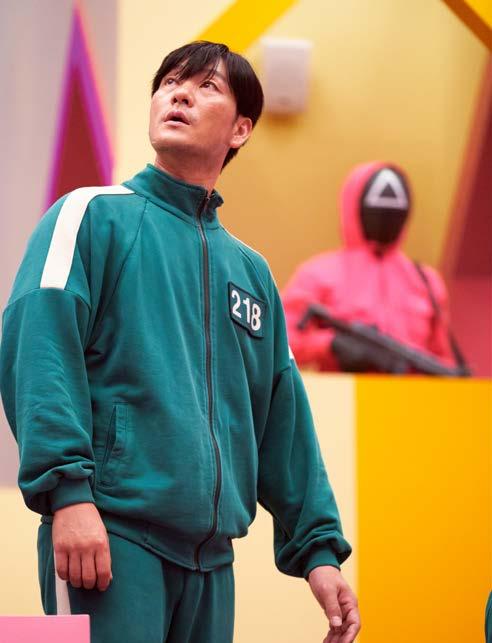
Netflix
The Korean serial killer
Squid Game’s huge popularity is boosting Netflix but Shilpa Ganatra believes its success should not have come as such a surprise
hotbed of talent. Not, of course, forgetting the global phenomenon that was The Masked Singer.
But it required deep pockets and far-reaching connections to turn the country’s creative potential to success on western screens. Enter Netflix. Alongside such “K-drama” successes as Sweet Home and Kingdom in 2020 alone, Netflix pumped $500m into Korean original programming – a staggering figure that was likely to pay dividends at some point.
“This is not a cheap little show that has popped up out of nowhere,” says Harries. “It’s a bit like The Crown. Although we could have made a success of The Crown elsewhere, we wouldn’t have been able to do it the way we did if we hadn’t gone to Netflix.
“Hwang would have said to Netflix that he could do Squid Game for two bob, but it wouldn’t really work, and Netflix had the guts, I assume, to agree to do it properly. Then, because they’ve done it properly, it really works.”
Subtitled in 37 languages and dubbed in 34, it appeared on our screens primed for a global viewership. The series’s $21.4m budget allowed for a premium production, including the vast swathes of uniformed guards that, as Harries points out, evoke the chilling imagery of fascism. And the money supported a bold set design, striking in its juxtaposition of playground visuals with its twisted premise and gory violence.
“It’s such a singular, recognisable proposition and it became very memeworthy,” says Davies. “It has this rich stream of things that took off quickly on TikTok and Instagram. I remember seeing the tracksuits, logo, symbols and honeycomb before I’d even watched it. That’s not something that every show on TV can replicate, and it keeps it in the cultural conversation.”
That in itself made it easier to build coverage in traditional media. “When something grows organically, it makes a journalist’s job more interesting,” says Davies. “At The Guardian, we could do things like interview the creator who said that he lost six teeth in the process, interview the VIPs and we did a piece on whether the subtitles were actually accurate. Sometimes, letting things just percolate isn’t the worst thing in the world.”
Squid Game’s appeal also relates to the structure of the series. Tranter says: “I liked not having to wait a week between the episodes, but I got a lot watching it on a Monday, thinking about it, and then watching it the following evening. It had a very cliffhangery, old-fashioned, highly serialised element to it.
“You don’t often talk about formats in this way with a drama, but, because it’s a competition reality show, where the stakes are the highest they could be, you know at the end there will be one winner. You know by the amount of screen time who are going to be the
last ones standing, but you don’t know the particular combination of it, or how or why.”
While it wasn’t perfect – Tranter calls the bluntly drawn depiction of the VIPs “impactfully disappointing” – all in all, Squid Game may show us the direction of travel for TV drama. For starters, there seems to be a stronger stomach for gore and violence. Additionally, watching subtitled shows is no longer the reserve of arthouse programmes.
“It doesn’t spearhead it, but it confirms the pattern of increasing success with drama shows that aren’t from the US,” adds Harries. “Lupin from France, Barbarians from Germany and The Crown and Succession, which is largely a British show, provide further evidence.
“The mediocrity of a great number of American shows is being exposed a bit. When American shows are good, they’re really good. But, given the amount of American shows that go on Netflix every week, it’s interesting that the ones that are cutting through are often non-American shows.”
While some may see Squid Game as the start of a “death-game drama” resurrection, Davies warns that “people don’t necessarily want Squid Game copy and paste”.
For Tranter, the contained, sparse set that went against the grain of current productions piqued her interest. “It put
the nature of the human condition under the microscope in a heightened way. If a good trend could come out of it, it would be about simplifying a production, and allowing it to be all about text and performance.”
Does the expansion of global competition mean that British dramatists should be worried? Not according to Harries. “Any competition is healthy,” he says. “In terms of coming up with original ideas, we’ve got to remain fresh and up to the challenge because there’s no doubt that you’re seeing shows from all over the world pop up with great success.
“But we’ve got some of the best people in the world making television here, so we’re always going to produce strong work.” n
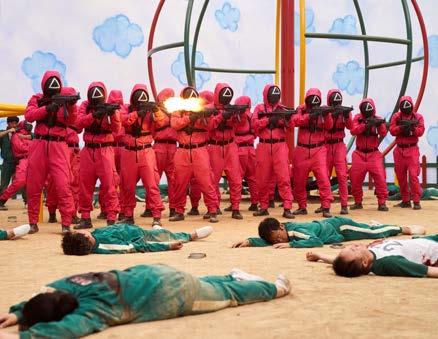
Netflix
Why the small things matter
Climate Change: Ade on the Frontline
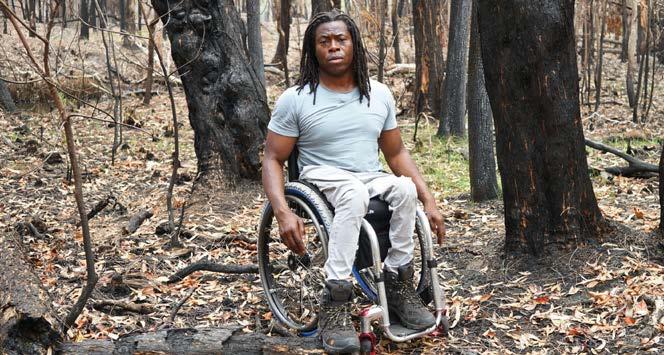
One of my first TV shows was about endangered animals around the world,” recalls presenter Ade Adepitan. “When I met with the producer and director, they told me: ‘This show is going to involve scuba diving in the Great Barrier Reef, trekking through the jungle in South Africa and Namibia, and hiking up mountains in Romania. We don’t want you to feel under any pressure, but is this something you think you can do?’ I said: ‘When do we start?’ I’m the sort of person who takes things on and then finds the solution as we go along.
“When a disability becomes frustrating is when decisions are made for you and before you’ve had a chance to have any input. Often, if you sit down with that disabled person, you can find solutions. If we can send someone to the moon, we can make TV sets accessible.”
As an intrepid presenter and wheelchair user, Adepitan has seen the agility and creativity of the TV industry applied to uncover these solutions. One example he cites is a camera operator on location during another production who, rather than film Adepitan from above or crouch in a way that would be bad for his back, asked to borrow a spare wheelchair to film from.
The result was “completely different and far more immersive” footage, says Adepitan. “It wasn’t a big adjustment. We didn’t have to call in Elon Musk to come up with a groundbreaking idea. It was just thinking outside of the box and using simple ideas to make life easier for all of us.”
Diversity is increasing in other areas, too. The stunning performances of the deaf contestant, EastEnders actor Rose
‘Ayling-Ellis, in the current series of Strictly Come Dancing has raised the issue of deafness with huge audiences and has been inspirational for deaf people, demonstrating that deafness can have no limits. The show has also been praised by deaf charities for incorporating sign language and gestures, including the Makaton sign for thank you. And, in one unforgettable moment, as her tribute to the deaf community, the music was stopped midway through the routine while Ayling-Ellis and her partner continued the dance in silence. However, across the industry, deaf, disabled and neurodivergent people face a daunting range of practical challenges. A recent survey by The Sir Lenny Henry Centre for Media Diversity found that long, irregular hours were a consideration for 65% of disabled people working in TV. Issues such as being unable to drive or physically use equipment was a consideration for 51%, while 14% needed assistance from other people, such as support workers
Shilpa Ganatra discovers how, for disabled people working in TV, even minor adjustments can pay big dividends
or British Sign Language interpreters.
As the social model of disability emphasises, it’s not the impairment that’s the problem but the lack of adjustments available on, say, the studio floor or location. “Everyone has things they can and can’t do,” says director, producer and presenter Richard Butchins, director of BBC Two’s Targeted: The Truth About Disability Hate Crime. “No one thinks someone who wears glasses is disabled – because the adaptation is effective. But imagine a world without glasses.…”
He adds: “I self-shoot, and I shoot well, and tech helps me with that because it means you’re less reliant on physical factors.”
Technologies such as screen readers, live captioning and well-designed hardware have become much more sophisticated in recent years. These help deal with some of the issues disabled people face regularly.
Actor and writer Genevieve Barr, who starred in BBC One crime drama The Silence, agrees: “As a deaf screenwriter who is oral [ie, who uses verbal communication], I prefer video calls employing live automated captions. The adjustments in environments during Covid have been a really positive change – people are more willing to communicate this way, and there have been rapid improvements in technology to enable automated captions.”
Though the pandemic has seen the overall employment gap between disabled and non-disabled people widen, one positive aspect has been that home working is now more accepted – a move embraced by many disabled (and non-disabled) people.
It demonstrates, says Sam Tatlow, a creative diversity partner at ITV, that the industry is capable of significant change: “Two years ago, when working on a production, the very thought of doing so from home was an alien concept.
“For a long time, there has been resistance to changing how we do things because of the fast turnarounds.… There’s never enough money and enough time to deliver what we’re producing at the quality that we want to deliver. But the past 18 months has proved that there is some flexibility.”
The 2010 Equality Act created a legal obligation for an employer to make reasonable adjustments to overcome barriers for disabled employees. “But what is and isn’t considered reasonable is a grey area,” says Tatlow. “Ultimately, it’s about enabling disabled people to do the job that they’ve been hired to do.”
Butchins suggests that budgets should have room in them for supportive measures to help disabled staff. “I always argue that the tariffs broadcasters pay are predicated on [shows] being made by able-bodied people,” he says. “There is still some implicit reluctance to use disabled people as decisionmakers think it will make the production more difficult or more expensive.
“But if it costs you a little more to use
someone who’s disabled, do it. You’ll easily get your money back, because disabled people have something to prove, so they’ll work hard. And you’ll find that different point of view that production companies are looking for.”
Tatlow adds: “Often, it doesn’t cost a lot. The practicality of it might involve doing things slightly differently, such as adjusted working hours so that rests can be taken throughout the day.
“When things do cost money, it’s often not very much. I’m a wheelchair user and I make use of the Access to Work scheme [a state-funded initiative to support any special requirements for disabled people]. It pays for my taxi from the train station to the office. But, in the gap between me starting at ITV and having the scheme in place, ITV paid for it.”
The biggest consideration for disabled people is one that costs nothing to adjust: the attitudes of their colleagues.
Seventy-one per cent of disabled people surveyed say they think about it when they consider their work options. Of course, budgeted training and information provision do help, but a shift in the mindset of co-workers alone could lead to a better working environment.
With only 5.8% of off-screen workers in the UK TV sector being disabled, compared with about 20% of the working-age population, broadcasters say they are keen to redress this balance. ITV aims to have 12% of its workforce made up of disabled people by 2022; Sky’s target is 10% of off-screen production by 2023, while Channel 4’s entry-level trainee scheme says that it particularly welcomes disabled people.
The BBC’s Elevate scheme concentrates on the issue of disabled people leaving the industry after working for a few years.
And a recently announced joint Netflix and BBC scheme is directed at raising the number of shows that are written, created or co-created by deaf, disabled or neurodivergent people over the next five years.
But far more can be done. The Creative Diversity Network is pushing for changes to the Access to Work scheme to make the funding more practical for an industry reliant on speed and shortterm contracts.
In his MacTaggart Lecture at the 2021 Edinburgh TV Festival, dramatist Jack Thorne announced that he, Barr and production manager Katie Player had founded Underlying Health Condition, a pressure group to tackle the lack of representation and accessibility for disabled people in British TV.
This month, they begin their activities with a survey and report on studio spaces and facilities companies. “The accessibility issue is profound and – as pointed out by the survey and real case studies – deeply troubling,” says Barr. “There’s plenty of motivation out there for change, but there is a need for something more substantive.
“Disability is a complicated nut to crack, and intent is not enough. Change is happening at a glacial pace, and we are asking for something better.” n

Rose Ayling-Ellis competing in Strictly Come Dancing
BBC
Rt Hon Nadine Dorries MP, Secretary of State, DCMS
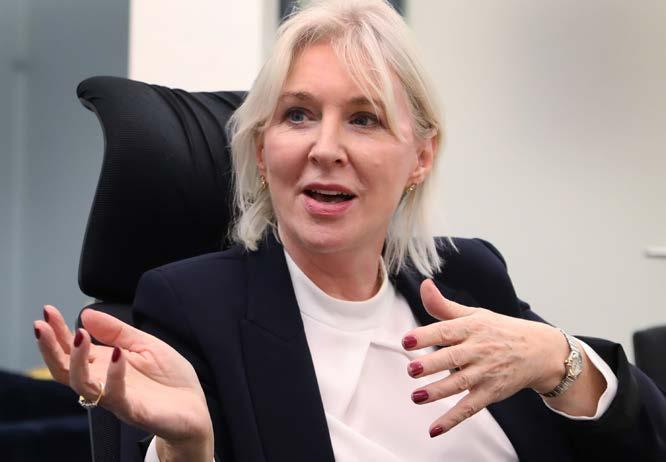
Enter Nadine Dorries
If you like your politicians colourful and outspoken, look no further than Nadine Dorries, the 13th Secretary of State for the Department for Digital, Culture, Media and Sport in the past 14 years. As an Observer profile recently noted, most people agree that she is “a character”.
Unusually for a serving MP, she famously appeared in the 2012 season of ITV’s I’m a Celebrity… Get Me Out of Here!, where she was the first contestant to be voted out. This was despite winning a Bushtucker Trial by consuming a lamb’s testicle and an ostrich’s anus. Some of her fellow MPs – she entered Parliament in 2005 – were not amused. She was punished for abandoning her constituents by having the Conservative Party whip temporarily withdrawn.
In the interim, her political star has risen, thanks, in part, to her devoted loyalty to one Boris Johnson. Surprise and even incredulity were two common reactions to her ministerial promotion in mid-September, one of the results of a particularly brutal cull at what was once known as the Ministry of Fun. “Not only was John Whittingdale, who understood broadcasting deeply, sacked, most of the other ministers at DCMS were also got rid of,” notes one interested observer. “This has meant a steep learning curve for Nadine Dorries.”
Her elevation comes at a crucial time for the UK broadcasting sector. A new media bill is promised in the new year, and the Online Safety Bill continues its slow progress through Parliament.
Born in Liverpool, part of her childhood was spent on a council estate in Runcorn. She has described times when her family used to hide from the rent man when they had no money to pay him, and how, “on some days, there would be no food”.
Her father was a bus driver, who died early in her nursing career (she trained as a nurse at Warrington General Hospital). She left the region when she met her partner, Paul Dorries, a mining engineer who became a financial adviser. The couple spent a year in Zambia in the mid-1980s, where he ran a copper mine and she headed what she has described as a community school.
On her return to the UK, she founded Company Kids Ltd, a child day-care
Steve Clarke profiles the new culture secretary, ex-reality TV star and bestselling author, who holds the future of the BBC and Channel 4 in her hands
service for working parents. Dorries sold the business to Bupa, the private healthcare company, in 1998, and it was then that she set her sights on politics, becoming an MP in 2005.
The arts and media community’s reaction to her appointment has been, to put it mildly, sceptical. Playwright and screenwriter James Graham, an acute witness of British politicians and their aides, said: “I never want to be an artist who rolls their eyes every time there’s a new culture secretary. Nevertheless, it’s a bit worrying that it feels like an appointment deliberately designed to needle and provoke. That might be unfair, and I hope it’s not.”
He spoke for many when he added: “I’d prefer rhetoric from a minister who is supportive and wants to amplify and champion the sector.”
Opinion in political circles on Dorries’ abilities is divided. Her critics regard her as an eccentric, unpredictable figure who might be better off sticking to writing bestsellers than serving as a Cabinet minister.
Others, however, insist that she is a super-bright Parliamentarian who has risen to every political challenge presented to her (she was appointed Minister of State at the Department of Health and Social Care in May 2020).
For them, her maverick behaviour is driven by a desire to show the male Tory establishment that, despite being brought up on a Liverpool council estate, she is in every sense their equal. “This explains why Nadine can be spikey and even chippy,” says someone who has watched her way of operating.
Stewart Purvis, a former CEO of ITN and Ofcom board member and now a non-executive director of Brentford FC, inclines towards the latter view, having seen how quickly she grasped a complex brief concerning the ownership of football clubs during her first day in the Commons as Secretary of State.
“The day after she was appointed, it was her turn to do departmental questions and she was asked a question about the Brentford Golden Share. This is a fairly esoteric issue, where fans can choose a director and hold a golden share in the club, and might be used as a model in the Government’s new football policy.
“She was right across this and knew all the detail. You may have laughed at her when she appeared on I’m a Celebrity… but, to me, this showed she was very quick to master her brief.”
Her populist credentials are strong. As well as appearing on I’m a Celebrity… and writing Mills & Boon-style novels, she is a devoted fan of Coronation Street, something that was clear when she recently visited the soap’s set.
“Unlike most other culture secretaries, it was obvious that she was a regular viewer of the Street,” notes a witness to her visit. “It was also clear that she was very keen on opportunities for people who are under-represented in TV. She spent more time talking to young, diverse apprentices on the set than to anyone else.”
This desire to encourage people like herself to thrive in a sector still regarded as being too posh for its own good squares with her recent attack on what she regards as the BBC’s tendency towards nepotism, when she accused the organisation of groupthink. “We’re having a discussion about how the BBC can become more representative of the people... who pay the licence fee, and how it can be more accessible to people from all backgrounds, not just people whose mum and dad work there, and how it can become, once again, that beacon for everyone,” she told a journalist from the Daily Telegraph.
Dorries added: “I want the arts and culture, and the BBC and other organisations, and journalism, [to create] a �
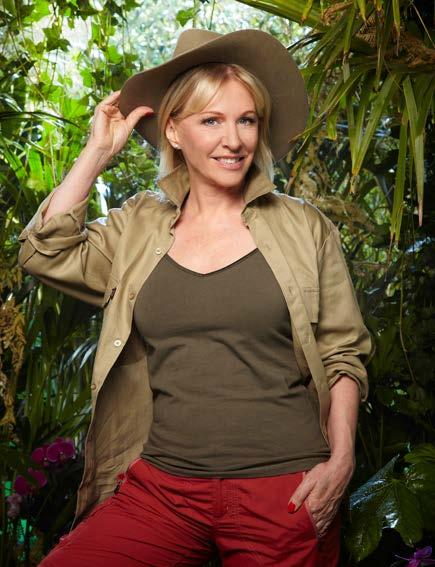
Nadine Dorries on I’m a Celebrity… Get Me Out of Here! 2012
ITV


